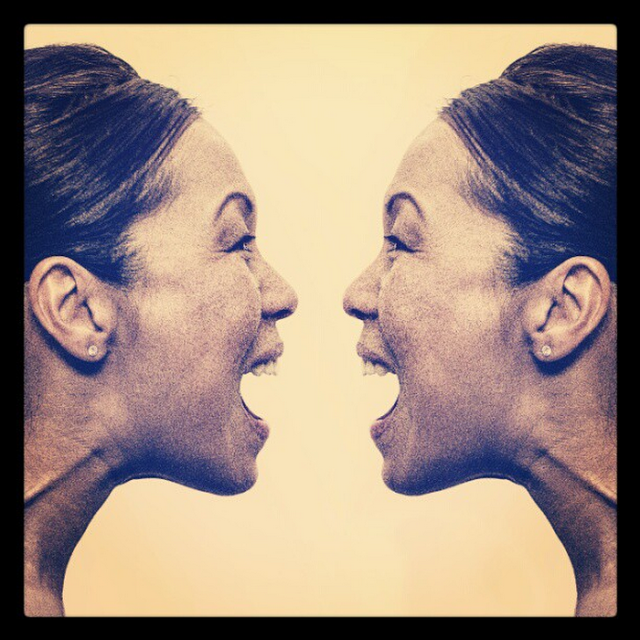From the Brazilians
During the first weeks I knew my now ex-husband, he described a pretty nasty fight he got into with a friend. The next day, we walked by the same person in the street. My ex greeted him warmly and patted his shoulder.
I was so confused. Was that the same guy he was describing yesterday? Since I spoke rudimentary Portuguese, there was always the possibility that I had been totally mistaken, and he either wasn’t in a fight at all, or not with that person!
Those kinds of misunderstandings were happening all the time. But when I asked, he confirmed that it actually was the same guy he fought with the day before. In that moment, I understood a deep ethos of Brazilian culture that you can be angry, sad, cheia de saudades (overcome by nostalgia)—and you can let it pass.
People can be people, truly human, and you don’t have to judge them. You can express how it affects you, what you think, and then move on. And in doing so it can strengthen rather than disintegrate the relationship. You can fight, wholeheartedly, and then next day without processing be friends again.
From My Daughter
“Why? Why did you pick a dad who didn’t want to take care of me, who would just leave me? It’s time for you to level with me, what really happened with you two?”
The latter question seemed suspiciously influenced by a television show or family movie. I have never hidden anything from my daughter about my relationship to her dad. But she needed to hear again what happened.
So again, I told her how passionately in love with her dad I was, how badly I wanted her, but how it didn’t work out for us to be husband and wife. I told her that I know she is the perfect daughter for me.
“Every mom says that to her daughter.”
No, I don’t think every mother loves their daughter like I love you. You are the biggest dream I ever had fulfilled. So I don’t regret picking your dad, because without him you would be different and I wouldn’t want a different daughter.”
She is not assuaged. The anger is deep.
Me: “Are you angry with me?”
Eyes averted: “If you say so.”
Me: “So you are angry.”
Her head turns slow motion towards me, gaining momentum to yell, “ Yes I am angry with you. Why, why would you pick someone who doesn’t want to take care of your daughter?”
White Hot Anger
I went through a good deal of my life thinking I wasn’t really an angry person. My default was sad. Until I finally recognized that I was angry a lot of the time. My version of anger was white hot, not red hot. I could be silent, stone-like, and stewing. And yes, angry.
Red Hot Anger
But here was the deeply felt wrath, the red hot anger, of my daughter, directed at me—her safest, nearest target. I knew I needed to allow the anger a safe outlet, a vehicle for all her questioning about her place in the world. We just moved from her birthplace of Brazil to California a month ago, so father/friends/street/food/feelings are all mixed together. Parsing them out is happening in the nighttime—the times when we let go and travel to the unfamiliar. The time when she is alone and un-shepherded.
Then she turned a layer inward. Her rage turned towards herself.
“I don’t deserve you, you deserve a better daughter. You deserve a daughter without a temper, without this big toe, without these eyebrows,” naming the traits she inherited from her dad. My heart raced, throat gripping, tears now close to the surface, pained to see this deep internalization and pretzel-wrapping of confusion, longing and existential wrangling.
I don’t want to talk her down, to placate or distract her, but I want her to get to the other side. She reminded me later that night, “Mom, I am just a six year old girl. I need your support.”
“Cece, those things are perfect to me. I don’t want a daughter without your temper, your big toe, and your eyebrows. I wanted you.” Then the tears began to fall: “Those things you see as imperfections are the things I love about you.”
These exchanges put me in the center of the fire. I have lived the guilt and shame of these same questions she is asking. Years ago, I asked myself the same things “How could I have chosen this father, who will not be a present parent?” Or what is wrong with me that this happened? Now she is asking what is wrong with her?
On the other side, as painful as it is, I had to come to terms of the learning that this is my path. And that my daughter has her own path. I would love to protect her from pain and difficulty, but I can’t. This is her destiny she is living. It is heart wrenching to see her suffering and wrestling with these big questions.
At the same time, she is a deeply thoughtful, aware and expressive being as a result of living her path. As a mother, it is so tempting to try to create “ideal” and “perfect” conditions, but at least on my path, that hasn’t been possible. In fact, that is one of my biggest parenting lessons to date. I have to confront my ideals and sometimes compromise them in favor of what works, of what is possible.
From My Client
As life would have it, this showed up in my inbox this morning:
“It’s been an intense couple of days surrounding this new moon but I feel somewhat liberated by experiencing such intense anger. I’ve been able to harvest a lot from this experience through journaling and some creative expression work. Although I’ve learned, like so many other women, that society values ‘keeping the peace’ and being polite, this doesn’t really fit with my personality. Even though I’ve known this with my head for some time, it still requires a great amount of effort to change these longstanding patterns. One step at a time. This was maybe just a bigger step than those previous. So thanks for your help in freeing my pelvis from some anger turned inward.”
From the Brazilians
Estou com raiva. Literally: “I am filled with rage.” The first time I heard that, I was terrified. In English, rage is reserved for serial killers. What comes after rage? Now I understand that rage underlies a lot of the indignation and sadness that I have felt about injustices all over the world and even toward my own child. A red hot rising, overtaking my body, want to reach out and throttle.
Rage just wasn’t in the permitted range of emotions of my familial or cultural upbringing.
What I learned was more in the direction of Goldilocks.
Not too big, not too small. Not too much.
Don’t get too big (brag, glorious, radiant, happy). Don’t get too small (depressed, demoralized, existential.)
Be fine. Cheerfulness is good.
From My Daughter
These days I have a lot of respect for anger-–my own and others’. My six year old daughter got in a fight with a 12 year old boy on the school van. He was teasing her and she eventually couldn’t take it, hauled off and hit him.
American response, with righteous indignance: “You can’t hit someone. You gotta keep your hands to yourself. You can’t lash out at someone else when you are angry.”
Brazilian response, “That’s right, you have to defend yourself. Be careful when you are fighting someone older than yourself, you could really get hurt. But that was really courageous.” (She did get a black eye out of it.) Human and realistic.
From the Animals
These days I have an increasing respect for the role of emotion as a human motivator and as pathway to the most essential and organic animal of ourselves. The sanitization of our basic animal instincts is leading to all kinds of weird phenomena. More babies than ever are born “tongue-tied,” not able to breastfeed without surgical intervention. Women are having a hard time giving birth—worldwide Cesarean rates are on the rise, and births are taking longer. People “communicate” more and more without being in each other’s physical presence.
Most of us are distanced from nature—the dirt and messiness, the power and order beyond our comprehension. That which we cannot control. I think as a whole we could stand to experience a little more out of control-ness. We could start with our anger, so that we weren’t struggling so hard to be composed and in control all the time. That often comes across as boring. We bore ourselves and we bore others when we settle for a little puny flame in lieu of a roaring fire. Our appearance of being in control, the farce that we are trumping nature, is actually creating a subterranean insecurity, vast loneliness and increased disconnection.
Anger can be one of the roads to the center, of visceral sensation, leading us closer to our soul-voice.
It’s not at all what we may have pictured as our ideal path. Certainly not what we probably pictured as an enlightened path. These days, students balk at the ideal of the old-fashioned Zen teacher who bats his students awake. Students leave Iyengar conventions when his wrath, and deep care, unfold into a smack and a castigation.
We have conflated good, tolerant and patient with spiritual. We have often left out the ire, the desire, the cunning and the discriminate. And so our resilience in the face of wrath is shrinking. We are more exercised in dealing with a slim bandwidth of emotional and energetic range, that does not include the outliers or bliss and rage.
From the Gods
The archetypes offered to us as women in the West seem pretty limited. As angry as the Virgin Mother, the Prostitute, and the Crone gets is the Woman Scorned, whose anger flares in reference to a betrayal by a man. We don’t see a lot of the Fierce Protectress, the Lioness Mother, the Defender of Children, or the Ultimate Creatrix, out of whom sprung the rest of the universe. The anger in these versions (and there are so many more, thanks to the multiplicity around the world) is in reference to injustice, encroachment or a stance for truth, among other reasons.
When the darker feminine expressions surface in our personal lives, the reception can be less than positive. When expressing full blown emotions, including anger, women are often labeled as hysterical and crazy, and untrustworthy. Or, God forbid, “Emotional.”
Chameli Ardagh passionately expresses the power of the The Fierce Face of the Feminine in this TED talk.
She eloquently shows how the wrath of Kali is balanced by the pure awareness of Siva. Watch the video to get a visceral sense of how these expressions of anger differ.
May we, as women, reclaim our fierceness and harness the power of our anger so that our voices can be heard. The future of our planet depends on it.
Thanks to Kristin Hauser for sharing Chameli’s video with me, and for spurring the inquiry.
Thanks for Karen Maezen Miller for her groundbreaking book: ZenMomma: Walking the Crooked Path of Motherhood.
~
~
~
Love elephant and want to go steady?
Sign up for our (curated) daily and weekly newsletters!
Editor: Travis May
Photo: Pixoto/Jason Bo







Read 5 comments and reply